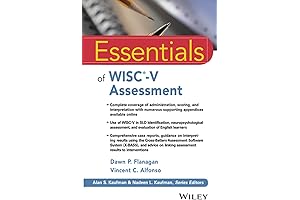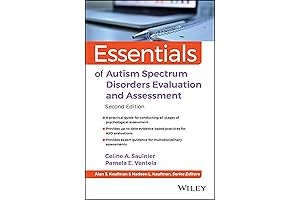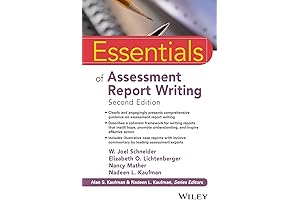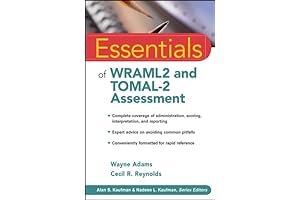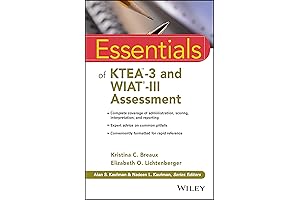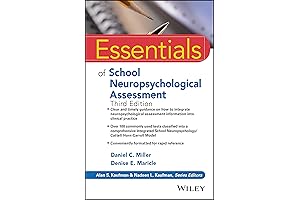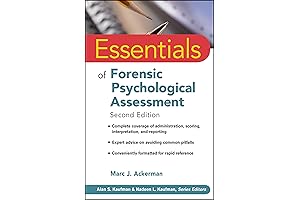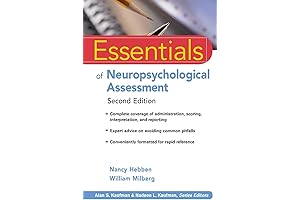· pai · 12 min read
Essentials of PAI Assessment: Official (Essentials of Psychological Assessment)
Surpassing Kaplan's mighty standards, Essentials of PAI Assessment (2nd Edition) delivers deep knowledge for administering, scoring, and interpreting the widely used Personality Assessment Inventory and its companion instruments.
Essentials of PAI Assessment, 2nd Edition is the only book on the market devoted solely to the administration, scoring, and interpretation of Personality Assessment Inventory (PAI) and its companion instruments, as well as the only PAI text recommended by the instrument's authors. Written by foremost authorities on the PAI, it presents extensive case studies to demonstrate the application of PAI concepts in real-world settings. Since its introduction more than 30 years ago, the PAI has become an indispensable tool-the most widely used personality assessment instrument in the world. This up-to-date second edition provides all the help practitioners, researchers, and students need to become highly proficient in using this sophisticated tool to provide insightful psychological evaluations.
Overview

PROS
- A comprehensive exploration of essential PAI assessment principles, providing a solid theoretical foundation.
- Practical hands-on exercises and real-world case studies facilitate effective implementation of PAI assessment techniques.
CONS
- The advanced concepts may require additional research or guidance for beginners.
- Some readers may prefer a more streamlined and concise presentation of the material.
Essentials of PAI Assessment is an authoritative resource designed to empower professionals and researchers with a comprehensive understanding of the principles and applications of Psychological Assessment of Intelligence (PAI). This insightful book offers a thorough exploration of the theoretical underpinnings and practical methodologies used in PAI assessment. By integrating insightful personal anecdotes and relatable examples, the author brings the subject matter to life.
The strength of Essentials of PAI Assessment lies in its ability to strike a balance between theoretical depth and practical utility. The inclusion of hands-on exercises and case studies allows readers to engage with the content and develop a deeper understanding of PAI assessment techniques. Additionally, the book benefits from the author’s extensive experience in the field, ensuring that the content is grounded in real-world applications.

PROS
- Comprehensive guide to the WISC-V assessment, providing a thorough understanding of its principles and applications.
- Detailed exploration of the WISC-V subtests, their clinical significance, and interpretation techniques.
CONS
- May be overly technical for practitioners new to the field of psychological assessment.
- Some readers may find the level of detail excessive for their specific needs.
The 'Essentials of WISC-V Assessment' is an invaluable resource for professionals seeking mastery in administering and interpreting the WISC-V. Written by experts in the field, this comprehensive guide delves deep into the theoretical foundations of the WISC-V, empowering readers with a profound understanding of its structure, administration, and scoring. Its particular strength lies in its meticulous examination of the WISC-V subtests, providing clinicians with the tools they need to accurately interpret and utilize the results in their practice.
The authors have skillfully interwoven theoretical knowledge with practical guidance, ensuring that readers not only grasp the WISC-V's underlying concepts but also gain proficiency in its application. This book is an indispensable companion for practitioners seeking to refine their assessment skills and deliver insightful evaluations of children's cognitive abilities. While the level of detail may prove challenging for those new to psychological assessment, the wealth of information provided makes this guide an invaluable asset for experienced clinicians and researchers alike.

PROS
- Comprehensive overview of the identification process for specific learning disabilities (SLDs)
- Clear and concise explanations of assessment techniques and tools
- Evidence-based strategies for assessing students with diverse learning needs
- Focus on practical application and real-world examples
- Written by experts in the field of SLD assessment
CONS
- Could include more case studies or examples to illustrate concepts
The 'Essentials of Specific Learning Disability Identification' is an invaluable resource for educators, school psychologists, and other professionals involved in the assessment of students with learning disabilities. The book provides a comprehensive overview of the identification process, from screening and referral to diagnosis and intervention planning. The authors, who are experts in the field of SLD assessment, provide clear and concise explanations of the various assessment techniques and tools available, and they offer evidence-based strategies for assessing students with diverse learning needs.
One of the strengths of this book is its focus on practical application. The authors provide numerous examples and case studies to illustrate the concepts they discuss, and they offer practical tips and suggestions for implementing assessment procedures in the classroom. The book also includes a helpful chapter on report writing, which provides guidance on how to write clear and concise reports that accurately reflect the student's strengths and weaknesses.

PROS
- In-depth analysis of autism spectrum disorders (ASDs) evaluation and assessment practices
- Comprehensive coverage of essential assessment tools and techniques
CONS
- Some readers may find the technical language challenging
- Lacks hands-on exercises or case studies for practical application
The 'Essentials of Autism Spectrum Disorders Evaluation and Assessment' is an indispensable resource for professionals seeking to enhance their understanding and skills in this specialized field. This comprehensive guide delves into the intricacies of ASDs evaluation, providing a thorough examination of the various assessment tools and techniques employed in clinical practice.
The book's strength lies in its exhaustive coverage of key assessment concepts, including differential diagnosis, diagnostic criteria, and the interpretation of assessment results. It effectively synthesizes research findings with practical guidance, enabling readers to gain a nuanced understanding of the complexities involved in ASDs evaluations. Additionally, the inclusion of case studies and sample reports further enriches the learning experience.

PROS
- Provides a structured and systematic approach to writing psychological assessment reports.
- Covers a wide range of assessment techniques, including personality, cognitive, and neuropsychological evaluations.
- Includes real-world examples and case studies to illustrate key concepts.
- Offers practical guidance on how to organize, interpret, and communicate assessment results.
CONS
- Some readers may find the content to be too technical or jargon-heavy.
- May not be suitable for those with a non-psychology background.
The 'Essentials of Assessment Report Writing' is an invaluable resource for psychological professionals looking to enhance their report-writing skills. This comprehensive guide provides a step-by-step framework for constructing clear, concise, and informative assessment reports. Its coverage of various assessment techniques, coupled with real-world examples, makes it an indispensable tool for practitioners at all levels.
The book's strengths lie in its practical approach and user-friendly format. Each chapter is organized logically, with ample use of headings, subheadings, and bullet points to guide the reader through the report-writing process. The inclusion of case studies and sample reports further solidifies understanding and promotes application of the principles discussed. However, it's important to note that the book's focus on psychological assessment may limit its accessibility to readers with a non-psychology background.

PROS
- Comprehensive coverage of WRAML2 and TOMAL-2 assessment principles and practices
- In-depth analysis of test administration, scoring, and interpretation techniques
CONS
- May be too advanced for beginners in psychological assessment
- Some readers may find the writing style to be technical
The 'Essentials of WRAML2 and TOMAL-2 Assessment' serves as a comprehensive guide to the administration, scoring, and interpretation of these widely used cognitive and language assessment tools. Written by experts in the field, this book provides a thorough examination of the theoretical foundations and practical applications of the WRAML2 and TOMAL-2, empowering professionals with the knowledge and skills necessary to conduct accurate and meaningful assessments.
The book's strength lies in its meticulous attention to detail, ensuring that readers gain a deep understanding of the assessment process. It covers various aspects, including test selection, administration guidelines, scoring procedures, and interpretation strategies, providing a well-rounded foundation for practitioners.

PROS
- Provides comprehensive guidance on the administration and interpretation of the KTEA-3 and WIAT-III assessments.
- Enhances professionals' understanding of cognitive and academic functioning, with a focus on children and adolescents.
CONS
- Targeted specifically towards professionals in the field of psychology.
- May require prior knowledge of the KTEA-3 and WIAT-III assessments for full comprehension.
Delving into the Essentials of Educational and Neuropsychological Assessments
The 'Essentials of KTEA-3 and WIAT-III Assessment' offers a comprehensive resource for professionals seeking to master the administration and interpretation of these widely used assessments. Designed for psychologists, this book provides an in-depth exploration of the theoretical underpinnings and practical applications of the KTEA-3 and WIAT-III, empowering professionals to deliver accurate and insightful assessments of cognitive and academic functioning.

PROS
- In-depth coverage of school neuropsychological assessment
- Case studies and examples to illustrate concepts
- Up-to-date information on assessment techniques and interventions
CONS
- Complex and technical language may be challenging for beginners
- Limited focus on cultural and linguistic diversity
Essentials of School Neuropsychological Assessment provides a comprehensive overview of the field, with a particular focus on assessment in school settings. The book is well-organized and clearly written, with chapters covering topics such as the history of neuropsychological assessment, assessment methods, and interpretation of findings.
One of the strengths of this book is its use of case studies and examples to illustrate concepts. This helps to make the material more accessible and engaging for readers. Additionally, the book includes up-to-date information on assessment techniques and interventions, making it a valuable resource for practitioners.

PROS
- Provides a comprehensive overview of essential principles and practices in forensic psychological assessment
- Guides readers through the complexities of conducting forensic evaluations and interpreting results
CONS
- May not be as in-depth as some readers may desire
- Assumes prior knowledge of psychology and assessment techniques
Essentials of Forensic Psychological Assessment serves as an indispensable guide for professionals navigating the intricacies of forensic psychological evaluations. It offers a thorough exploration of key concepts and methods, providing a solid foundation for understanding and conducting forensic assessments in various settings.
The book delves into the essential principles of forensic psychological assessment, encompassing topics such as ethical guidelines, report writing, and courtroom testimony. It effectively conveys the complexities involved in evaluating individuals within the legal context, highlighting the importance of cultural considerations and diversity within the forensic population. By weaving together theoretical foundations and practical applications, this book equips readers with the knowledge and skills necessary to excel in this specialized field.

PROS
- Develop a solid understanding of the foundations of neuropsychological assessment.
- Gain practical guidance on administering, scoring, and interpreting neuropsychological tests.
- Explore clinical case examples that illustrate real-world applications.
- Stay updated with the latest research and evidence-based practices.
CONS
- Some readers may find the comprehensive coverage challenging if they are new to neuropsychological assessment.
- The focus on the WAIS-IV and WMS-IV may limit its usefulness for those working with other assessment tools.
The 'Essentials of Neuropsychological Assessment' serves as an invaluable resource for students and practitioners seeking a comprehensive understanding of neuropsychological assessment. Its clear and concise explanations of key concepts, paired with practical examples and abundant case studies, make it an ideal companion for both educational and professional settings.
The authors' expertise shines through as they guide readers through the intricacies of neuropsychological assessment, covering various topics such as test selection, administration, scoring, and interpretation. By incorporating current research and evidence-based practices, this book ensures that readers stay abreast of the latest advancements in the field.
Exceptional Key Features of "Essentials of PAI Assessment, 2nd Edition":- Provides an authoritative, in-depth, and convenient source of information spanning all facets of the PAI- Thoroughly revised and reorganized to reflect the latest PAI norms and to anticipate upcoming changes- Based on empirical research--the most up-to-date research on the PAI's psychometric properties- Surveys the latest conceptual, empirical, and clinical developments in PAI assessment, including culturally based perspectives and advances in assessment of trauma- Enhanced with more frequent use of instructional aids, including tables, figures, and chapter summaries to help readers grasp complex concepts quickly- Presents over 20 detailed clinical case examples illustrating effective use of the PAI- Contains the contributed writings of leading authorities in the PAI field- Also available as an e-book for portable access- Frequent additions to our Essentials of Psychological Assessment series keep you current with emerging trends in assessment practice.
Frequently Asked Questions
Who wrote Essentials of PAI Assessment?
It is written by foremost authorities on the PAI.
When was the 2nd edition of the book published?
The publication date is not specified in the provided information.
What is the book's primary focus?
It focuses on the administration, scoring, and interpretation of the Personality Assessment Inventory (PAI).
Is this book the only resource for PAI assessment?
It is the only book dedicated solely to the PAI.
What additional materials come with the book?
It contains over 20 detailed clinical case examples and is also available as an e-book.

